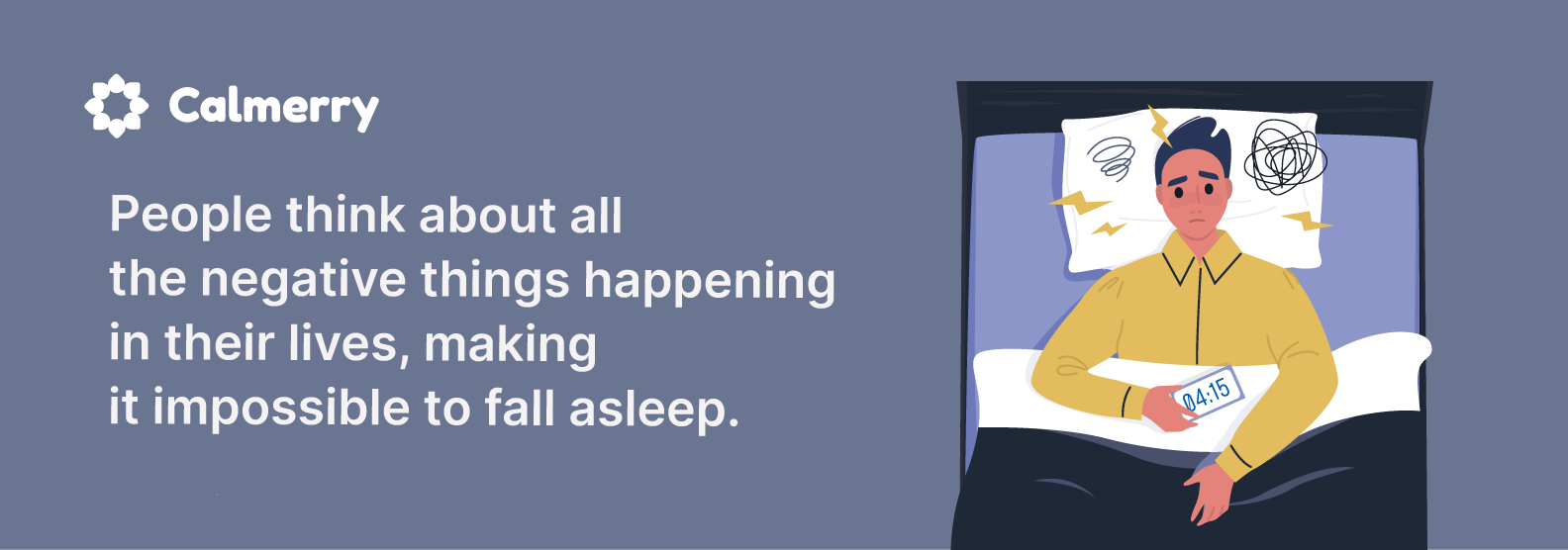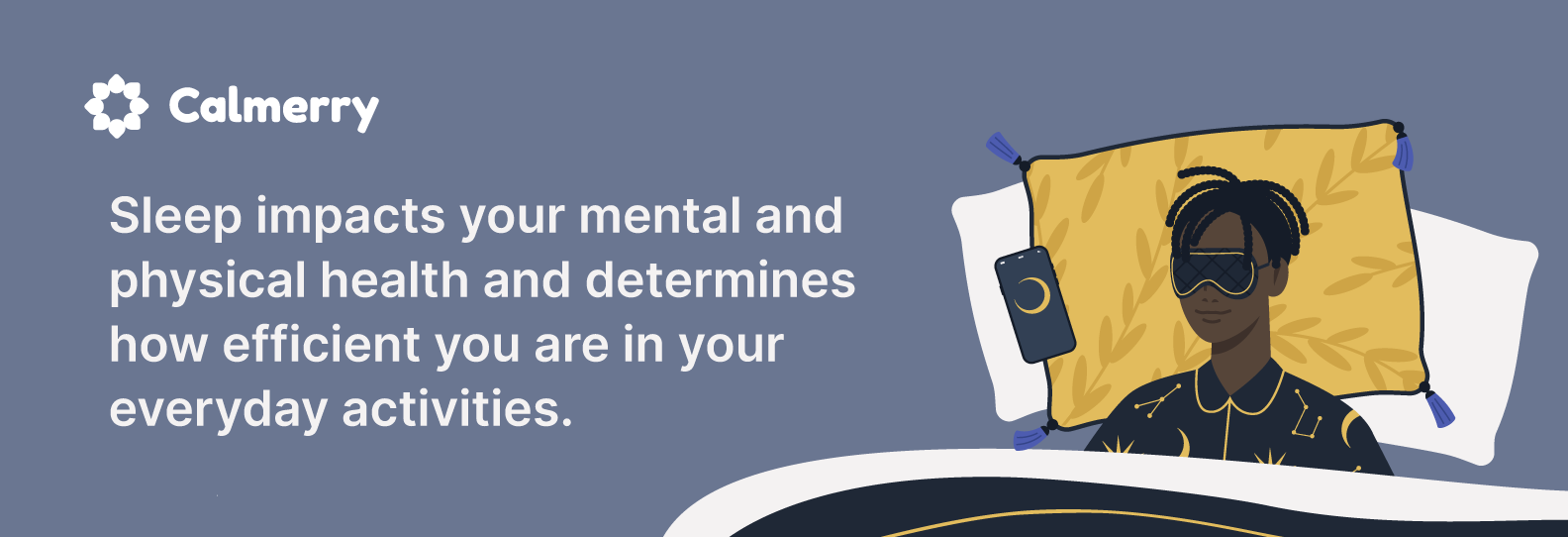Reasons Why You Can’t Sleep At Night and Possible Solutions

In this article
We’ve all been there. You’ve been tossing and turning all night long, and the minute you’re about to fall asleep, your alarm goes off. The aftermath is irritability, mood changes, inability to concentrate, and fatigue. These are the consequences of a bad night’s sleep.
A restful night, on the other hand, makes you feel fresh and ready to face the day. Some of the benefits of a good night’s sleep include improved energy levels, better concentration, improved health, and more.
But how do you reap these benefits when you’re struggling with insomnia? The trick is to understand why you’re having trouble sleeping and address the root cause of your problem. Below are some of the factors that might be contributing to your trouble with sleep and putting your health at risk.
Poor bedtime routine
Most people with sleep problems have a poor or non-existent bedtime routine. There are several tell-tale signs that you have a bad bedtime routine. These include watching TV, scrolling through your phone for hours, drinking excess liquids, and not having a set sleep schedule.
If you have these poor sleep habits, they may be the cause of your lack of sleep. The good news is that you can turn things around. Try the following:
- Create a sleep schedule – wake up and go to bed at the same time every day.
- Do something relaxing – take a warm bath, read, or do some light stretches.
- Keep your laptop and phone away – avoid social media and work before bedtime or in the bedroom.
- Turn off the lights – darkness stimulates the production of the sleep hormone melatonin.
- Eat healthy foods that contain a good mix of complex carbs and proteins – eating fatty foods in the evening can make it harder to rest.
- Limit fluid intake – taking in excess liquids increases your bathroom visits and interrupts your sleep.
You’re on medication
Certain medications also cause insomnia. Examples include alpha-blockers, beta-blockers, corticosteroids, and statins. If you noticed your sleep changes after you started taking medication, there’s a great chance the drugs are causing the problem.
The best thing to do in this situation is to speak to your doctor. Explain your concerns and find out if you can switch to a different medication. You can also try an alternative treatment or therapy.
Problems with room temperature
Room temperature also determines the quality of your sleep. If it’s too hot, you’re more likely to wake up in the middle of the night with night sweats. On the other hand, if it’s too cold, you won’t warm up enough to be comfortable to sleep.
The trick is to strike the right balance. Experts recommend keeping your room temperature between 60 and 67 degrees Fahrenheit. At this temperature, most people can drift off more comfortably and are less likely to awaken during the night. However, it’s advisable to tweak your temperature occasionally until you find your sweet spot.
Too much caffeine
No matter how much you love coffee, you should avoid taking it right before bedtime or late in the afternoon. Caffeine is a stimulant with a significant half-life. Half-life refers to the amount of time it takes to breakdown and excretes half the amount of a substance from your body. On average, coffee has a half-life of approximately five to six hours, and it can be more.

This means the coffee you take stays active in your body for this long. If your goal is to sleep better, enjoy your cup of coffee in the morning and avoid it the rest of the day. You should also try to avoid eating right before bed.
Exercise woes
Exercising is an excellent habit to adopt if you want to improve your sleep quality. However, if done wrong, it may cause sleep problems. It’s not advisable to do strenuous workouts or cardio late in the afternoon or right before bed. Doing so disrupts your stable heart rate and stimulates your entire nervous system, thereby making it harder for you to sleep.
To fix this problem, schedule your cardio and strenuous gym workouts for mornings or early afternoon hours. It’s also a good idea to exercise at least 3 hours before bedtime. You can use the evening hours for light activities like walking or yoga.
Stress, anxiety, or depression
Stress and anxiety are perhaps the most common reasons for insomnia. During the day, it’s easy to distract yourself with work and other activities. But when your head hits the pillow, your mind finds time to roam. In most cases, people think about all the negative things happening in their lives, making it impossible to fall asleep.

There are several things you can do to overcome stress and improve your sleep quality. These include:
- Journaling: Write down what’s worrying you and list things you’re grateful for.
- Change your location: Get out of bed without turning on the lights and go into a different room to break your cycle of thoughts.
- Meditate: You can do it during the day or right before bedtime to relax your mind and body.

Alcohol before the bedtime
While alcohol tends to make you feel sleepy because the initial effect of drinking alcohol is relaxation, too much can disrupt your sleep cycle. Alcohol interferes with the circadian rhythm, which is the body’s “master clock” responsible for regulating sleep, immunity, metabolism, and energy levels.
To improve your sleep quality, it’s best to avoid taking too much alcohol right before bedtime. Alternatively, you can enjoy your favorite drink during the day. Like coffee, alcohol has a long half-time, which means it stays longer in your body.
Your dinner was too heavy
Sometimes, the answer to how to sleep better is as simple as changing your eating habits. Eating too much food before bedtime sends your digestive system into an override, thereby making it harder for you to sleep.
The type of food also matters. Avoid fatty foods and junk foods before bedtime because they have the same effect. Instead, have a healthy snack a few hours before you get into bed. Ensure you’re having a mixture of complex carbohydrates and proteins, and don’t eat too much.
Sleep disorder
If you’ve tried changing your night routine, exercising, and living a healthy lifestyle but still struggling to sleep, you may have a sleep disorder. Here are some of the common disorders that can be very bad for your sleep.
- Insomnia is a common sleep disorder marked by the trouble of falling or staying asleep. It affects about 35% of adults.
- Sleep apnea is a serious sleep disorder marked by abnormal breathing during sleep.
- Narcolepsy is a long-term condition that affects the ability of the brain to control sleep/wake cycles.
- Restless leg syndrome causes uncomfortable feelings in the legs and an irresistible urge to move them; the symptoms can get worse at night.
If you suspect that you may have a sleep disorder, it’s best to consult a doctor. A health professional will be able to diagnose the sleep disorder and suggest possible solutions. Expect recommendations like a change of lifestyle and the use of special techniques that can help you sleep better. It may not happen overnight, but you’ll notice changes once the treatment starts becoming effective.

Wrapping up
The benefits of a good night’s sleep cannot be overestimated. Sleep impacts your mental and physical health. Furthermore, it determines how efficient you are in your everyday activities. Therefore, if you’ve been having sleep problems for a while, it may be time to identify the cause and find a solution.
If changing your lifestyle and bedtime routine doesn’t work, seek professional help because you may have a sleep disorder.
You should also seek help from a mental health professional if you suffer from anxiety and depression. Fully-licensed therapists at Calmerry can help you deal with your stressors and find healthy ways to cope with them. They will use evidence-based techniques to help you overcome the underlying causes of your sleep problems and develop healthy sleeping patterns for life.
Try Calmerry therapy
online therapy
live video session



